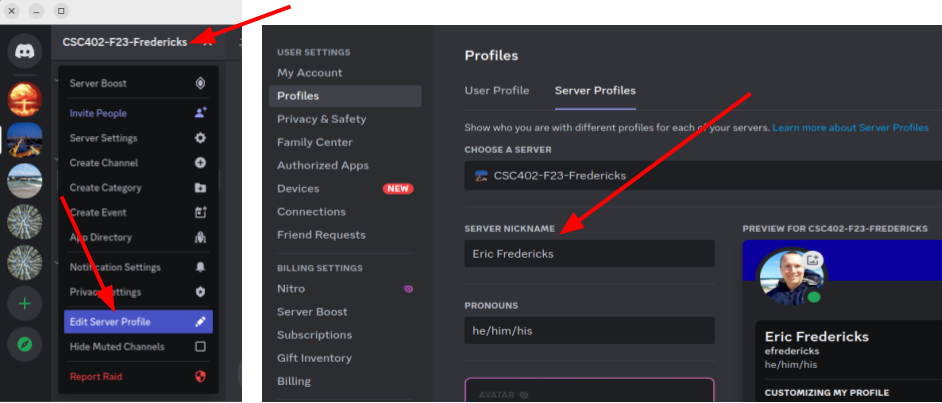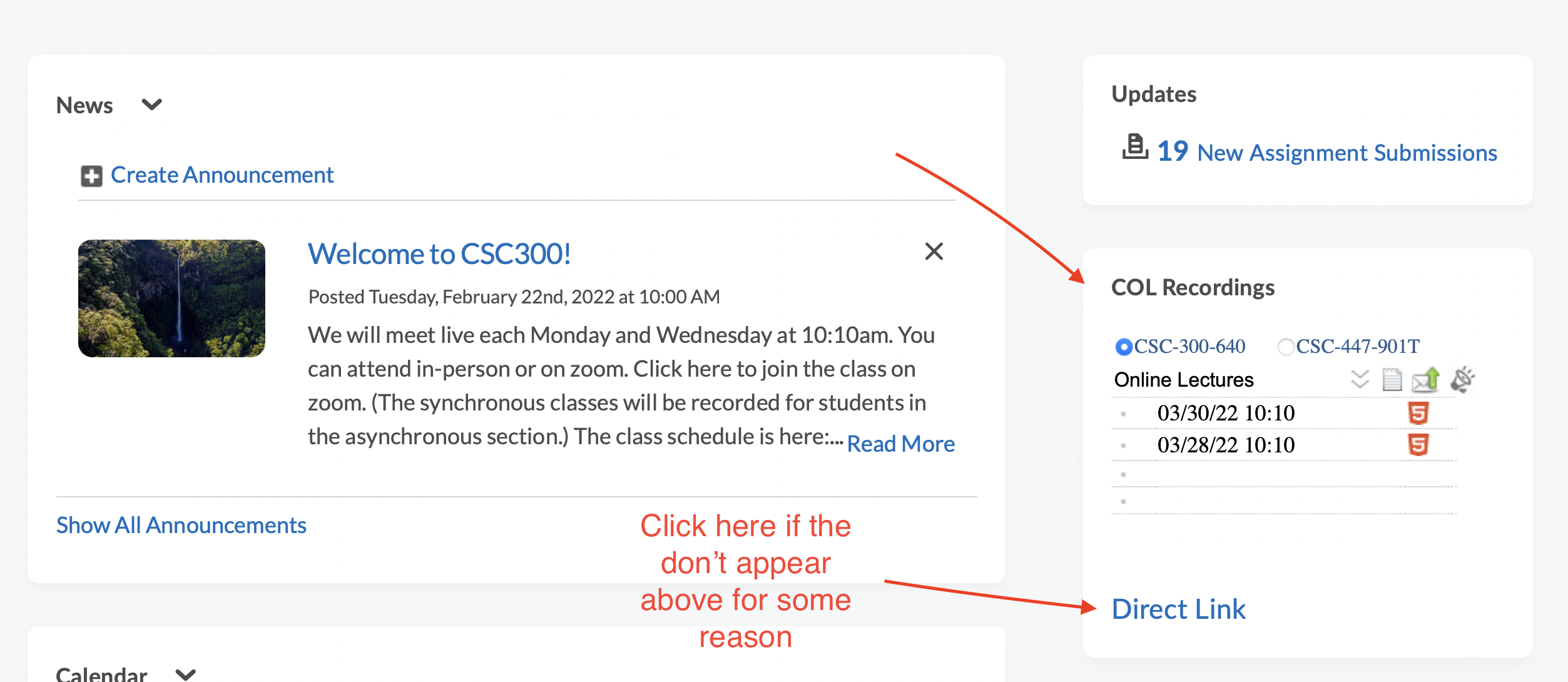Change your Server Nickname to be your first and last name. Use whatever firstname you prefer, but be sure that your last name is the same as it is in DePaul's Campus Connect.

| Contents [0/12] |
| Course Overview [1/12] |
| The curriculum [2/12] |
| Course Objectives [3/12] |
| Prerequisites [4/12] |
| Assessment [5/12] |
| Discussion Forum [6/12] |
| Course Homepages [7/12] |
| Contact Information [8/12] |
| Textbooks [9/12] |
| Expectations [10/12] |
| Policies [11/12] |
| Lecture Recordings for Asynchronous Students [12/12] |
(Click here for one slide per page)
| Course Overview [1/12] |
This is the first course in a two-course sequence on data structures using Java. The course introduces basic Java programming, reviews recursion, introduces asymptotic notations, and focuses mainly on linear data structures including arrays, linked lists and their variants, stacks and queues, and data structures supporting disjoint-set operations. The implementation of the basic operations on each data structure are discussed and analyzed in terms of their efficiency. The applications covered highlight and exploit the unique characteristics of the data structures, and emphasize problem solving and recursive thinking.
| The curriculum [2/12] |

| Course Objectives [3/12] |
Plus
resizable arrays
A data structure is a concrete implementation of an abstract type.
listtype in python
| Prerequisites [4/12] |
A prior programming class.
| Assessment [5/12] |
Grades will be determined as follows.
Minimum Final Exam Score
In order to get a C- or better in the course, you must demonstrate a minimum level of understanding of the course content. For this course, a minimum level of knowledge is demonstrated by a score of at least 65% on the final exam. If you do not achieve this score or higher, you will get a D+, D, or an F, and you will need to repeat the course.
DePaul's academic integrity policy
All students are expected to abide by the University's Academic Integrity Policy which prohibits cheating and other misconduct in student coursework. Publicly sharing or posting online any prior or current materials from this course (including exam questions or answers), is considered to be providing unauthorized assistance prohibited by the policy. Both students who share/post and students who access or use such materials are considered to be cheating under the Policy and will be subject to sanctions for violations of Academic Integrity.
Any submission for any assignment or exam in which there is evidence of an academic integrity violation is subject to sanction, up to and including failure of the course. At the very least, the student will receive a 0 for the assignment or exam in question. Additional sanctions may apply.
| Discussion Forum [6/12] |
We will use Discord as a discussion forum for class. It is my intention to create a learning community on Discord, so you should feel free to ask questions and engage with classmates on the material there.
Change your Server Nickname to be your first and last name. Use whatever firstname you prefer, but be sure that your last name is the same as it is in DePaul's Campus Connect.

| Course Homepages [7/12] |
Course D2L Page: D2L
Course Homepage: https://reed.cs.depaul.edu/efredericks/ds1
| Contact Information [8/12] |
| Instructor: | Eric J. Fredericks |
| Home Page: | https://www.cdm.depaul.edu/Faculty-and-Staff/Pages/faculty-info.aspx?fid=1604 |
| Email: | eric.fredericks@depaul.edu |
| Address: | School of Computing, DePaul University |
| 14 East Jackson Boulevard | |
| Chicago, IL 60604 | |
| Office: | Classroom |
| Class Page: | https://reed.cs.depaul.edu/efredericks/ds1 |
| Class Hours: | Thu 5:45pm-9:00pm in Lewis 1005 |
| Textbooks [9/12] |
Required Books
Core Java SE 9 for the Impatient, 2nd Edition [Amazon, Indiebound]
by Cay Horstmann (Addison-Wesley, 2017)
Available as Ebook
Older or newer edition is fine.
Algorithms 4e [Amazon, Indiebound]
by Robert Sedgewick and Kevin Wayne (Addison-Wesley, 2011)
Available as Ebook
(Author videos) These are also for sale as an Ebook
Companion site. Includes Lectures, Slides, Demos
Do not get an older edition. They are completely different books.
Recommended Books
Schaum's Outline of Data Structures with Java 2e [Amazon, Indiebound]
by John Hubbard (Schuams, 2009)
This book is a good source of example problems with solutions.
More Books
How to Think Like a Computer Scientist
by Allen B. Downey.
Free!
An good introduction to Java.
Skip the GridWorld chapters, which are intended to help with the AP exam in CS.
See also these lecture notes from MIT. The last four lectures may be particularly useful.
by Brad Miller.
Free!
Introduction to Programming in Java (Chapter 1)
by Robert Sedgewick and Kevin Wayne
Free!
This is the first chapter of the introductory text written by the authors of our primary textbook.
It presents the same material as section 1.1 of the primary text, but at a slower pace.
Effective Java 3e [Amazon, Indiebound]
by Joshua Bloch (Addison-Wesley, 2017)
Available as Ebook
The algorithms text describes all of the Java that is required for the class. The discussion is terse, making it an excellent reference. If you would like a longer discussion of Java, you might want a supplementary text. In this case, you might consider one of the following.
| Expectations [10/12] |
We will discuss new concepts each week.
You will have assignments, including quizzes, most weeks. Some of the homework assignments are programming assignments and some assignments may be written assignments.
We will review homeworks and quizzes in class. We will go over concepts that students find particularly difficult.
Getting the homework correct is not enough. Simply getting programming homework to work once will not help you communicate to me that you understand the concepts you need to learn. You need to learn how to draw pictures diagramming concepts we are covering, and to write code on paper, without a compiler, notes, Google, etc.
Repetition and iteration are key to learning! I recommend that when you repeat homeworks on your own, you get used to writing Java code on paper.
Keep doing this every day, and you will find that you will be able to write good clean code on paper that is intelligible to me when I'm grading your exams. If you write code on exams that indicates you have not internalized Java syntax and semantics, your exam grade will reflect this!
| Policies [11/12] |
Attendance
If you are in Section 801, you must attend class! If you do not attend class, you do not get credit for attendance and participation for that week.
Late Work and Flex Days
Due dates for every homework and quiz are provided on D2L. Unless otherwise stated, assignments are due on those days. Homeworks must be submitted on D2L and emailed homework will not be accepted.
Every student is allotted up to two Flex Days
that can be used to submit late homeworks and get extended time to take quizzes. I recognize that sometimes life happens.
In these instances, you may use one of your allotted Flex Days. Flex Days allow you to submit any homework and/or quiz due on a previous day up to one day late without penalty. You can use these days for any deadline (except for exams) and for any reason.
Flex Days apply to a deadline day
. For example: if you use one Flex Day, both your homework and your quiz deadline will be extended to 5:45pm one day after the deadline, and you still have one more Flex Day you can use in the future. Note that you may not use more than one flex day for any given deadline day.
You do not need to provide me with the reason for using a Flex Day: simply send me a message on Discord or email me and tell me you are using a Flex Day.
Flex Days are not automatic. You must send me a message before the Late Submission folder in D2L closes so I know you are using a Flex Day.
When submitting late homework when using a Flex Day, please make sure to submit it to the correct folder on D2L. Do not simply note in your late folder submission that you are using a Flex Day. I do not always read the comments.
Once you've exhausted your two flex days, any homework assignment submitted after the deadline will only receive partial credit. A homework assignment submitted by 5:45pm the day after the due date will only be eligible for 80% of the maximum number of points for that assignment. Late homework submitted after 24 hours is not accepted.
Late quizzes outside of the use of a flex day are not accepted. Flex days cannot be used for quizzes you have already completed.
Flex days cannot be used for exams.
Except as outlined above, deadlines are generally not individually negotiable! First of all, this course moves very fast and covers a lot of ground, so you will want to keep up with the material. Secondly, I want to get you feedback on your assignments quickly, so you can use that feedback as you study. And finally, I cannot keep up with grading multiple students' late assignments - it becomes very time consuming to context switch back to previous assignments.
If you experience extenuating circumstances (e.g., family emergency, you are hospitalized) that prohibit you from completing your quizzes and homework, please contact me as soon as possible. You will need to provide documentation within a reasonable amount of time to substantiate the situation. Do not contact me weeks after you failed to turn in homework or complete quizzes, asking for extensions. I don't have time for this. It's disrespectful. Communicate early and often.
Incomplete Grades
An incomplete grade is defined in the Student Handbook as follows (note that the policy in the undergraduate student handbook applies to both undergraduate and graduate students): A temporary grade indicating that the student has a satisfactory record in work completed, but for unusual or unforeseeable circumstances not encountered by other students in the class and acceptable to the instructor is prevented from completing the course requirements by the end of the term. Please see https://www.cdm.depaul.edu/Current%20Students/Pages/Grading-Policies.aspx for additional information.
Retro-Active Withdrawal
CDM understands certain extenuating circumstances can hinder one's ability for academic success and completion of course work. Please see https://www.cdm.depaul.edu/Current%20Students/Pages/Enrollment-Policies.aspx for additional information.
| Lecture Recordings for Asynchronous Students [12/12] |
Synchronous lectures are recorded for access after class.
You will find the lectures on D2L
